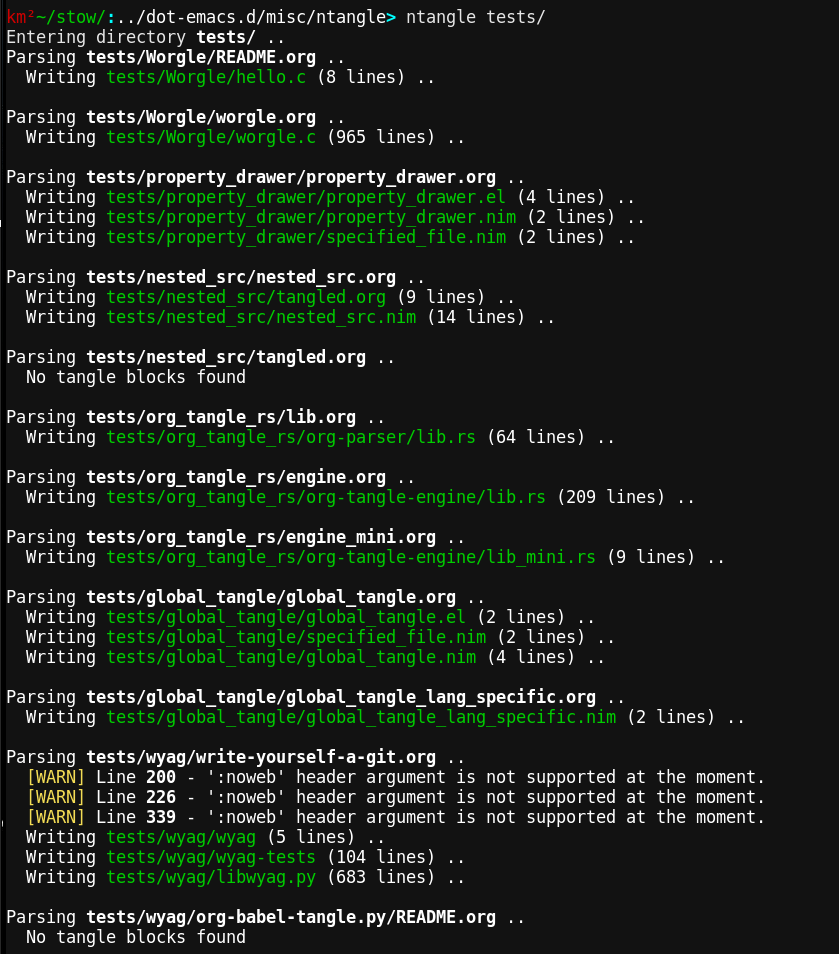Command-line utility for Tangling of Org documents — programmed in Nim.
From Org Manual – Extracting source code:
Extracting source code from code blocks is a basic task in literate programming. Org has features to make this easy. In literate programming parlance, documents on creation are woven with code and documentation, and on export, the code is tangled for execution by a computer.
Org facilitates weaving and tangling for producing, maintaining, sharing, and exporting literate programming documents. Org provides extensive customization options for extracting source code.
When Org tangles
srccode blocks, it expands, merges, and transforms them. Then Org recomposes them into one or more separate files, as configured through the options. During this tangling process, Org expands variables in the source code, and resolves any Noweb style references (see Noweb reference syntax).
You can visit the same Org manual section from within Emacs by going to this Info manual node: ~(org) Extracting Source Code~.
While the tangling of Org documents works great from within Emacs, it can be quite a bit slow for large Org documents. This project aims to provide almost the same tangling functionality at a much higher speed.
You do not need Emacs or Org mode installed to use ntangle.
~nimble~ can be used to install ntangle. This utility ships with Nim
installations. Think of it as the equivalent of the Python pip.
See *choosenim* installation to install *nim* and *nimble*.
To install ntangle:
nimble install ntangle
Above installs the binary in the ~/.nimble/bin/ directory.
- [X] Understands global tangle header-args in
#+propertykeywords - [X] Understands tangle header-args directly above Org source blocks
- [-] Understands tangle subtree property drawer header-args
- [X] Rudimentary parsing of the property drawer
header-args.
ntangledoes not check the validity of the property drawer (i.e.:PROPERTIES:appears immediately after the heading, and it ends with:END:, and that the properties are only between them, etc.). Alsoheader-argsis treated the same asheader-args+for simplicity for now. - [ ] Treat
header-argsvsheader-args+values correctly.
- [X] Rudimentary parsing of the property drawer
header-args.
- [X] Understands the precendence order of the tangle header-args when a mix of global and source block header-args are used
- [X] Language-specific header-args (e.g.
#+property: header-args:nim :tangle yes) - [X] Concatenating multiple source blocks to the same tangled file
- [X] Respects comma-escaping in source blocks
- [X] Removes common indentation, but also retains the indentation where needed
- [X]
:tangle - [X]
:padline - [X]
:shebang - [X]
:mkdirp - [X]
:tangle-mode - [ ]
:comments - [ ]
:no-expand
- [ ] Noweb support. I sorely miss the lack of
nowebsupport.. I use it heavily in ~eless~.
/There is no plan to support Org Babel functions with Noweb, like evaluating code blocks during tangling, etc. (just use Emacs for those :D)./
- [ ]
:noweb - [ ]
:noweb-ref - [ ]
:noweb-sep
Add one or more Org files (files with names ending in “.org”) or
directory names after the ntangle command. If directory names are
added, only the files in there with names ending with “.org” will be
parsed.
ntangle <FILE.org>
or a list of files:
ntangle <FILE1.org> <FILE2.org> ..
or a list of directories:
ntangle <DIR1> <DIR2> ..
or a mix of lists of files and directories:
ntangle <FILE1.org> <DIR1> <FILE2.org> <DIR2> ..
The tangled files will be created in paths relative to the source Org file.
You can find samples of the supported Org mode tangling in the *test* directory of this project.
ntangle expects the Org files to use the header-args property
syntax used in Org mode 9.0 and newer. There was a minor syntax change
with header-args property in Org 9.0 (see ORG-NEWS).
So if you used the below in Org 8.x and older:
# Deprecated syntax
#+property: tangle yes
Refactor that to:
# Org 9.0 syntax
#+property: header-args :tangle yes
Similarly, refactor a property drawer from:
# Deprecated syntax
* Some heading
:PROPERTIES:
:tangle: yes
:END:
To:
# Org 9.0 syntax
* Some heading
:PROPERTIES:
:header-args: :tangle yes
:END:
Below assumes that you have nim and nimble installed.
git clone https://github.com/OrgTangle/ntangle cd ntangle nimble build # creates the ntangle binary in the same directory # nimble build -d:release # same as above but creates an optimized binary
# cd to the git repo dir
./tests/test.shI was motivated to start this project after reading about the ~org-babel-tangle.py~ Python project by @thblt.
I wanted to just see how easy it was to translate a Python script to Nim (it was very easy!), and from there, this project started snowballing, gathering features of its own :).
